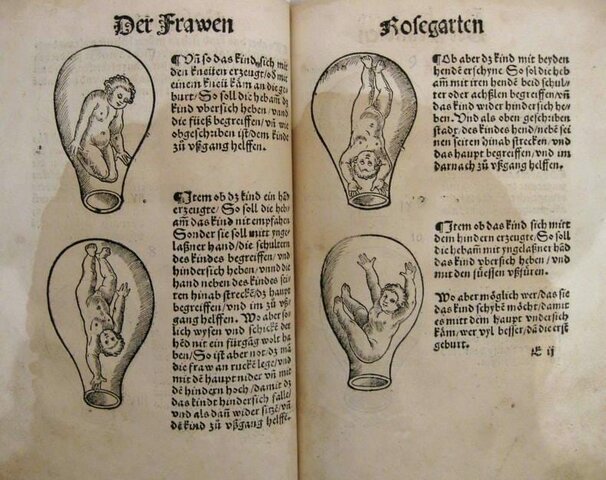There can be no more horrible stigma upon civilization than the history of childbirth.
Grantly Dick-Read
The first book on midwifery
Around 1513 the German Eucharius Röslin discovered the hidden works of Soranus and other ancient medical researchers. Around 1515 he wrote the first book on obstetrics, compiling it from carefully selected materials. It was a huge work on childbirth with examples taken from life.
9 years after its publication, Dr. Weiss from Hamburg decided to personally observe the birth of a child. Since it was forbidden for men at that time, he disguised himself as a midwife. His observations were invaluable, but other obstetricians soon figured out Weiss’ ruse and reported him to the authorities. Weiss was burned alive.

Maternity hospital times
Since 1847 childbirth began to be seen by women as a good thing, as at this time James Simpson discovered chloroform, ushering in the era of anesthesia. The church criticized Simpson for providing women with anesthetics during pathological childbirth. High church officials wrote: “Chloroform is a trap of Satan. Satan allegedly wants to make a woman happy, but in fact he is trying to make sure that in difficult moments of her life she turns in prayer to him, not to God.”
In 1854 Florence Nightingale was one of the first to speak about the fact that cleanliness and fresh air are extremely necessary for hospitals. Sloppy doctors and those who liked to drink began to disappear, and with their disappearance, the incidence of postpartum sepsis also decreased. However, the maternal mortality rate was still 12-15% among potentially normal births, which meant that one in eight perfectly healthy women died from postpartum sepsis.
Around the same time, the young Ignaz Philipp Semmelweis, who worked as a doctor in the Vienna maternity hospital, came to the conclusion that the cause of the deaths was inside the maternity hospital. Therefore, he made every obstetrician and student wash their hands in a solution of chlorine before visiting women. The mortality rate in his wards immediately fell to 3%, and later to 1%. Semmelweis’s discovery refuted the belief at the time that tampering with the laws of nature would cause death. Despite successfully saving lives, Semmelweis was asked to leave, as he “had no right to demand hand washing”. It broke him and he soon died under mysterious circumstances. It looks like death is caused, if not by interference with the laws of nature, then by interference with someone else’s stability. So, it’s better to stay at home and not interfere in anything.
Until 1866 they didn’t know anything about asepsis. As a rule, hospitals were organized by priests. Probably, they were guided by humane intentions, moving the sick to hospitals, because those who stayed at home died. The paradox is that those who came to the hospital to be cured died much more often. It is difficult to imagine how it was possible to amputate body parts and perform caesarean sections without any kind of anesthesia. Add to this sepsis, which was the cause of the high mortality rate. In 1866 Joseph Lister first began practicing antiseptics and continued to use them despite opposition and ridicule. Then Louis Pasteur discovered fermentation and vaccination, and Robert Koch discovered bacteria – they became the founders of bacteriology. (All of the above is taken from Grantly Dick-Read’s book “Childbirth Without Fear”)
“In pain shall you bear children”

For a long time, obstetrics was the work of surgeons, and this is obviously one of the main reasons for the perception of childbirth as a hellish torment. Add to this the “promise” from the Bible and the “experience” of previous generations, and you are guaranteed a painful birth. Of course, you will say that it’s easy for me to say, because it really hurt you! Well, have you adjusted to the fact that it won’t hurt? Have you prepared for hard work and learned to breathe and relax properly?
Dick-Read showed an interest in midwifery from childhood. Surprisingly, what he had to fight for was the right of a woman to give birth instead of a doctor. His intuitive and observant approach, which saw the beauty and wisdom of nature in childbirth, was widely perceived as pseudoscientific arrogance.
A special word about a well-known quote from the Bible: “To the woman he said, “I will make your pains in childbearing very severe; with painful labor you will give birth to children. Your desire will be for your husband,and he will rule over you.” (Genesis 3:16) This passage is known as the “curse of Eve” and it is he who “prepares” believers for the fact that childbirth must be and will be painful, since we, sinners, have earned this suffering ourselves. It’s funny when our most stupid ideas are established in this way because of a banal bad translation. The Hebrew word “etzev”, translated into Ukrainian by Ohienko as “torment”, and by most translators of the world as “pain”, “suffering”, etc., actually has such meanings as “work”, “effort”. This is what Dick-Read discovered when, with all due respect to the Bible, he decided to investigate why God wants a woman to suffer.
I will add another verbal case where work is mixed with suffering: the Old Slavic “strada” originally means hard work, struggle. Our Ukrainian “to suffer” (strazhdaty) also arose from this word. Over time, somewhere in the slums of human consciousness, what required an elementary effort equaled torment, you lazy people, just think about it, what a shame!
Therefore childbirth is not torment, not pain, not suffering, but hard work and effort. And the choice is yours – to remember that happy day as hell or as a day when you did a good job and got a tiny living reward for it.
And a final tip from Dick Read:
Be critical of culture; look long and carefully before you accept its tenets; take notice of the subtle ways and means by which youth is robbed of its power and its inborn genius. Be accurate in your deductions and delve deeple into the details of each succeeding problem. Analyze your observations and do not be slow to ask “”why”. Develop an inqiuiring mind; seek guidance and advice whilst you have around you those competent and willing to help you. There is no reson to be humble in your questioning, and certainly no justification for aggression in your differing. Learn from your mistakes, for if you seek honestly truth, the errors that you make will be of service in your search.
Grantly Dick-Read, “Childbirth without Fear”



